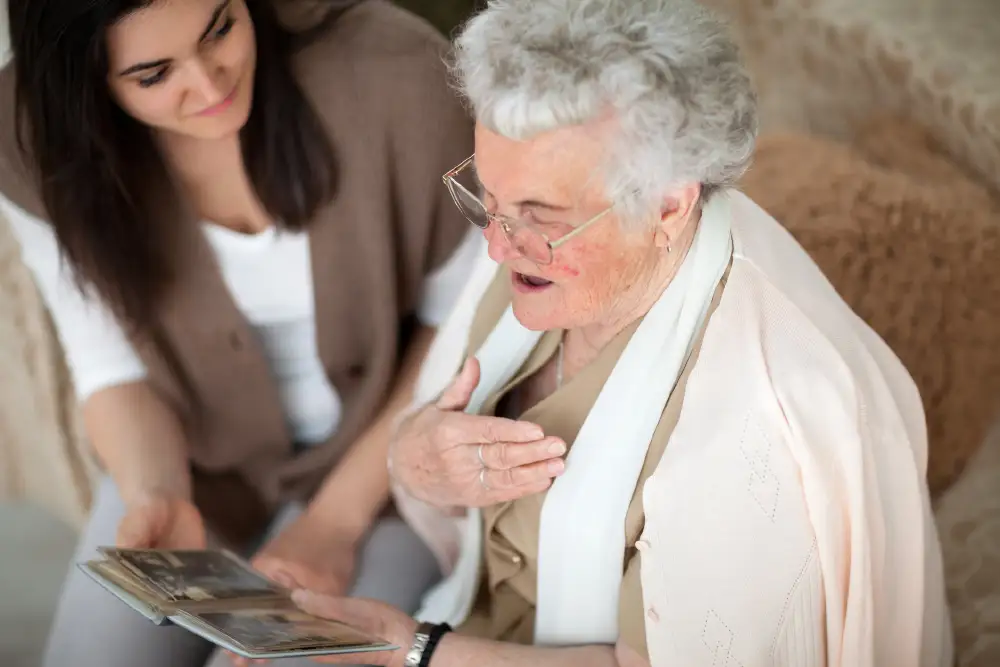Dementia affects more than the person living with the disease; it affects the entire family. Caring for a loved one with Alzheimer’s disease or another form of dementia is challenging. As memory loss progresses, caregiving demands increase. There will come a time when the demands are more than you can safely handle, both physically and emotionally.
Don’t be critical of yourself during this time. Know that it’s common among family caregivers to struggle with keeping up with daily tasks and lose patience with dementia patients. But help is available. Memory support communities for people with dementia can provide the care, safety, and lifestyle your loved one deserves – and the peace of mind you need.
Deciding to move a loved one to a memory support community is one of the most emotionally challenging experiences families face. The weight of responsibility, guilt, uncertainty, and grief can be overwhelming.
If you struggle with these emotions, please know you’re not alone. Many caregivers experience guilt when transitioning their loved ones to professional care, but understanding the importance of patience – both with your loved one and yourself – can help ease this difficult journey.
Remember, seeking specialized care isn’t abandonment – it’s an act of love and a commitment to ensuring your loved one receives the expert attention they deserve.
Understanding Dementia and Its Impact
Dementia isn’t a single disease but rather a collection of symptoms affecting memory, thinking, and social abilities severely enough to interfere with daily functioning. Alzheimer’s disease is the most common type of dementia, but there are several others, including vascular dementia, Lewy body dementia, and frontotemporal disorders.
As dementia progresses through its stages, both the older adult with dementia and their caregiver face increasing challenges, including:
- Early stage: Memory lapses and minor cognitive changes may be frustrating but manageable.
- Middle stage: Increased confusion, personality changes, and difficulty with daily activities require more hands-on care.
- Late stage: Extensive care needs, communication difficulties, and mobility issues often necessitate around-the-clock supervision.
Living with dementia significantly disrupts daily routines. Tasks that once seemed simple – getting dressed, preparing meals or engaging in conversations – become increasingly complex. For family caregivers, watching these changes unfold in someone they love is profoundly painful.

The Role of Patience in Dementia Care
Patience is perhaps the most valuable skill in dementia care. When caring for a person with dementia, patience helps create a calm, supportive environment that reduces stress for both the caregiver and the person receiving care.
Patience allows caregivers to:
- Respond thoughtfully rather than reactively to challenging behaviors
- Accommodate the slower pace at which someone with dementia processes information
- Create positive interactions despite communication barriers
- Accept repetitive questions or actions without frustration
Most importantly, patience helps preserve the dignity of the person with dementia. By responding with compassion rather than irritation, we acknowledge their worth beyond their cognitive limitations.
Practical Strategies To Enhance Patience
Developing patience with someone with dementia takes practice and intention. Below are some strategies to help build this quality:
Use gentle communication techniques
- Speak clearly and simply, using short sentences.
- Allow extra time for responses without rushing.
- Maintain eye contact and a calm tone of voice.
- Ask one question at a time and wait patiently for answers.
Practice mindfulness and self-awareness
- Take deep breaths when you feel frustration building.
- Recognize your emotional triggers and develop coping strategies.
- Stay present in the moment rather than dwelling on past abilities.
- Remember that behaviors are side effects of the disease, not intentional actions.
Set realistic expectations
- Adjust your expectations to match your loved one’s current abilities.
- Break tasks into smaller, more manageable steps.
- Be flexible with schedules and routines.
- Celebrate small victories rather than focusing on limitations.
Adapt as the disease progresses
- Learn about each stage of dementia to anticipate and prepare for changes.
- Regularly reassess care strategies as needs evolve.
- Seek education and training on specific techniques for different challenges.
- Be willing to modify your approach when something isn’t working.
Managing Caregiver Emotions and Guilt
The decision to move a loved one to memory support often triggers complex emotions, including profound guilt. You might question whether you’ve done enough, worry about how they’ll adjust, or feel like you’ve broken a promise to care for them yourself.
These feelings are normal, but it’s important to recognize some common misconceptions:
Myth: Moving a loved one to memory support means you’ve failed as a caregiver.
Reality: Recognizing when specialized care is needed shows wisdom and commitment to your loved one’s well-being.
Myth: Professional care means abandoning your loved one.
Reality: Memory support allows you to focus on quality time together rather than the exhausting demands of daily care.
Myth: No one can care for your loved one as well as you can.
Reality: Trained professionals with experience in dementia care can provide specialized support and promote a higher quality of life than most family caregivers can.
To manage these difficult emotions:
- Set boundaries to protect your own physical and mental health.
- Practice self-compassion by treating yourself with the same kindness you’d offer a friend.
- Allow yourself to grieve the changes in your relationship.
- Focus on the quality of your interactions rather than the quantity of care tasks.
- Seek professional counseling if guilt becomes overwhelming or debilitating.
Building a Support Network
No one should face the dementia journey alone. Building a strong support network is essential for maintaining your own well-being while supporting your loved one.
Consider these avenues for support:
- Family and friends: Be specific about how others can help, whether visiting your loved one, helping with errands, or simply providing emotional support.
- Support groups: Connect with others who truly understand your experience through in-person or online dementia caregiver groups.
- Professional resources: Consult with social workers, therapists, or geriatric care managers specializing in dementia care.
- Respite services: Take advantage of adult day programs or short-term care options to give yourself breaks.
- Educational resources: Knowledge is power – learn all you can about dementia through workshops, books, and reputable online sources.
Accepting help isn’t a sign of weakness but a necessary part of sustainable caregiving.

Benefits of Memory Support for Everyone Involved
Moving a loved one to memory support offers significant advantages for both the person with dementia and their family members:
For your loved one:
- Specialized care from staff trained specifically in dementia techniques
- A structured environment designed to reduce confusion and anxiety
- Appropriate stimulation through physical activity and tailored programs and therapies
- Social interaction with peers and staff to combat isolation
- Enhanced safety features to prevent wandering and accidents
For family caregivers:
- Relief from the physical and emotional demands of around-the-clock care
- Opportunity to restore balance to your and your family’s daily lives
- Peace of mind knowing expert help is available
- Chance to return to a loving family role instead of primarily being a caregiver
- Improved quality of interactions during visits without caregiving stress
Many families find that after an adjustment period, their relationships improve as they can focus on meaningful connections rather than care tasks.
Moving Forward With Confidence and Compassion
Patience with your loved one and yourself is an ongoing journey. Moving your loved one to a memory support community can be a responsible, loving decision that benefits everyone involved.
At The Village at Gainesville, we understand this transition is emotional for the entire family. We work closely with both residents and their loved ones to ensure everyone feels supported throughout the process. Our dedicated team creates individualized care plans that honor each resident’s unique history, preferences, and needs.
As you navigate this challenging time, remember to care for yourself and your loved one. Seek support when needed, practice self-compassion, and trust that you and your loved one can find new ways to connect and thrive with the right professional care.
When the time comes for professional memory support, we’re here for you and your loved one. Our compassionate team provides personalized care, helping both residents and families thrive. Schedule a tour today to see how we can offer the support and peace of mind your family deserves.

